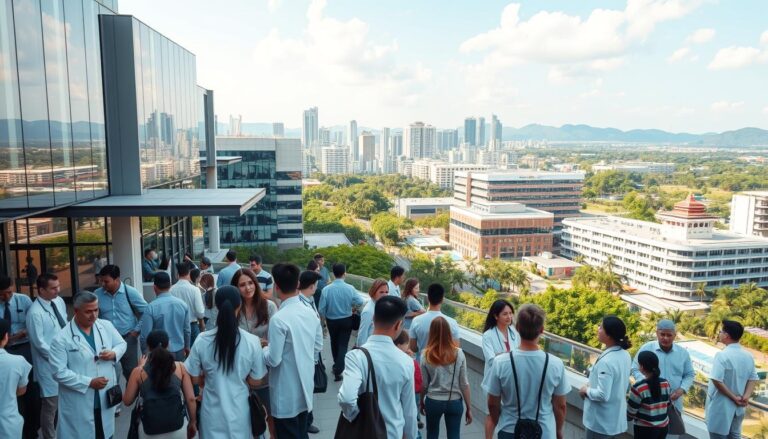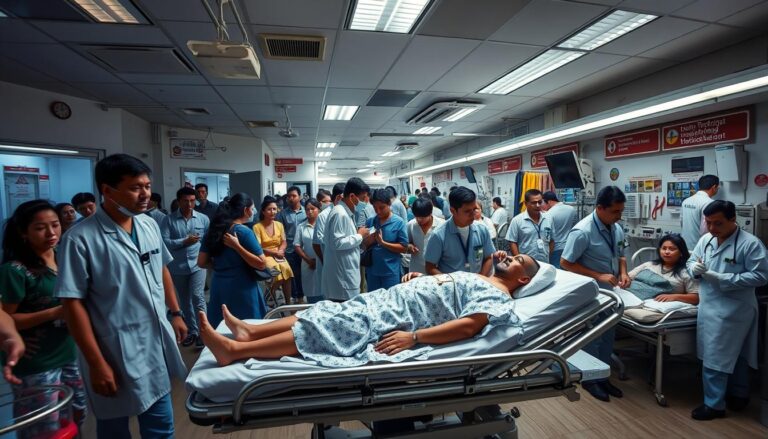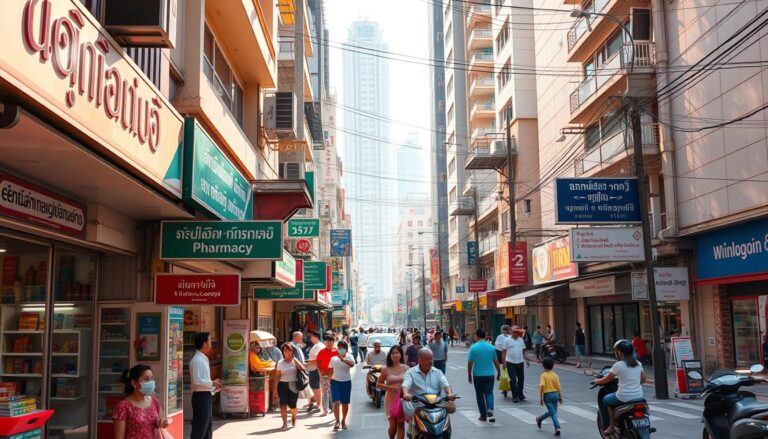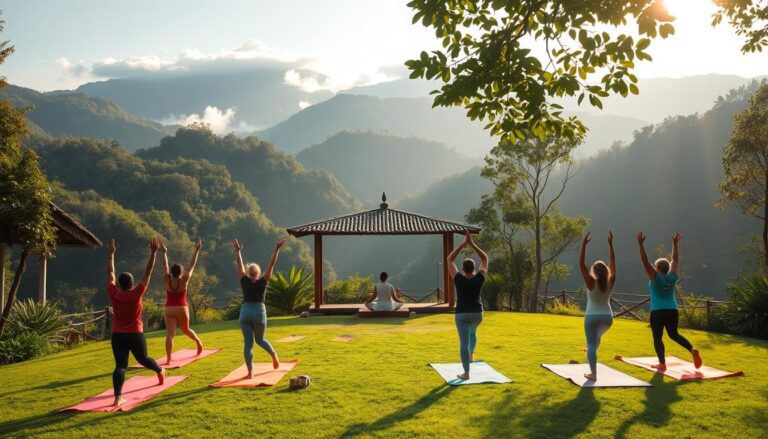Thailand Health Risks: Prevent Illnesses & Stay Safe
Did you know thousands of travellers to Thailand get sick every year? This is because of illnesses they could have prevented. As you plan your trip to this beautiful country, it’s important to know about the health risks you might face.
Knowing about these risks helps you have a safe and fun trip. Travelling to Thailand means experiencing a new culture and trying delicious food. But, it also means facing unfamiliar health challenges. Being ready and informed is your best way to stay healthy.
By taking the right steps and being careful, you can lower your chances of getting sick. This way, you can enjoy your trip without worrying about health issues.
Common Health Risks for Tourists in Thailand
Planning a trip to Thailand? Knowing the common health risks is key for a safe trip. Thailand is famous for its culture and landscapes but also has health challenges for tourists.

Foodborne Illnesses: What You Need to Know
Foodborne illnesses are a big risk in Thailand. Eating raw or undercooked meat, seafood, and eggs can cause food poisoning. It’s important to eat at places where food is cooked right.
Tips for Avoiding Foodborne Illnesses:
- Choose restaurants that are busy and have a high turnover of food.
- Avoid eating raw or undercooked meat, seafood, and eggs.
- Ensure that fruits and vegetables are washed properly before consumption.
Mosquito-Borne Diseases to Watch Out For
Mosquito-borne diseases like dengue fever, Zika virus, and chikungunya are common in some areas of Thailand. It’s important to avoid mosquito bites.
Preventing Mosquito Bites:
- Use insect repellents containing DEET, picaridin, or oil of lemon eucalyptus.
- Wear long-sleeved shirts, long pants, and socks when outdoors.
- Stay in accommodations with air conditioning or screened windows and doors.
Water Safety: Staying Hydrated and Healthy
Staying hydrated is vital in Thailand’s hot climate. But, it’s also important to drink safe water.
Tips for Staying Hydrated Safely:
- Drink bottled or filtered water.
- Avoid consuming ice or unpeeled fruits and vegetables that may have come into contact with contaminated water.
- Stay hydrated by drinking plenty of water throughout the day.
By knowing these health risks and taking precautions, you can lower your chance of getting sick in Thailand. A bit of preparation can make your trip healthy and fun.
Vaccinations and Precautions Before You Go
Before you head to Thailand, it’s key to talk about vaccinations and precautions. Being health-wise prepared can make your trip better.
Recommended Vaccinations for Travellers
It’s important to see a healthcare provider about vaccinations before going to Thailand. Vaccinations for hepatitis A and typhoid are often suggested. They help protect you from serious health issues while traveling.
- Hepatitis A vaccination is recommended for all travelers to Thailand due to the risk of contaminated food and water.
- Typhoid vaccination is advised, specially if you are traveling to areas with poor sanitation and hygiene.
- Other vaccinations such as hepatitis B, rabies, and Japanese encephalitis may be recommended based on your specific travel plans and activities.
Essential Health Checks Before Departure
Along with vaccinations, staying up to date on routine vaccinations is important. A health check-up before departure can help identify any underlying health issues that may impact your travel plans.
- Consult your doctor or a travel clinic to discuss your health and any necessary precautions.
- Ensure you have all the required medications and prescriptions for your travel.
- Check if any specific health certificates are required for your destination or activities planned in Thailand.
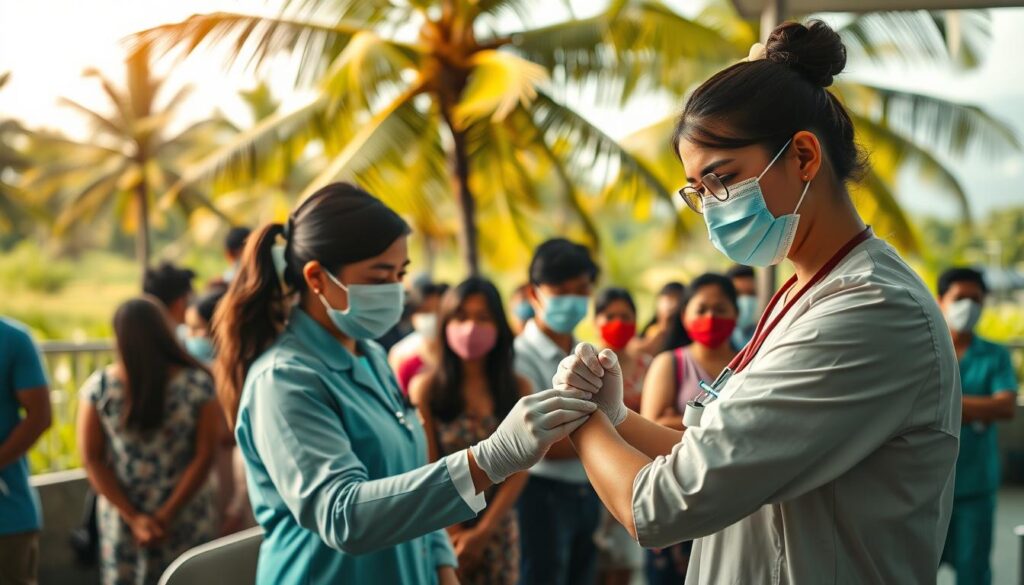
Staying Healthy During Your Trip
As you get ready for your Thai adventure, knowing how to avoid health risks is important. Thailand is known for its culture and stunning views, but it also has health challenges for visitors.
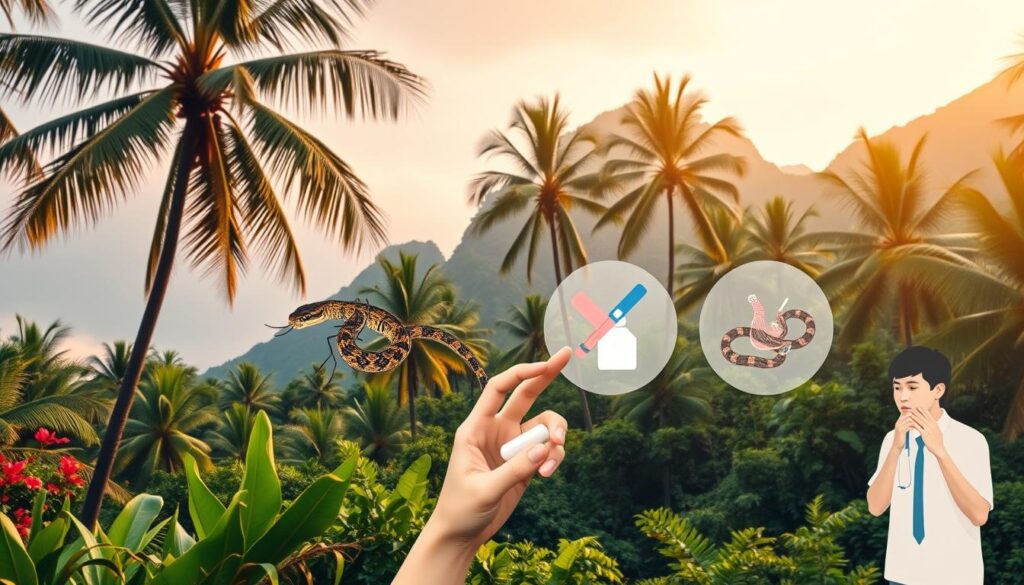
Tips for Eating Safely in Thailand
When eating in Thailand, be careful about where and what you eat. Choose busy restaurants and street food stalls for fresh, well-handled food. Stay away from raw meat, seafood, and eggs to avoid bacteria.
- Go for places that locals and other tourists like.
- Steer clear of raw or undercooked foods, like meat and seafood.
- Make sure fruits are clean or peeled before eating them.
Protecting Yourself from Insect Bites
Mosquito-borne diseases are a big worry in Thailand. Use insect repellent with DEET, picaridin, or oil of lemon eucalyptus to cut down on bites. Wear long clothes and socks outside, mainly when mosquitoes are most active.
- Put insect repellent on skin and clothes that’s exposed.
- Wear clothes that covers you well, like long sleeves and pants, at dawn and dusk.
- Use mosquito nets if you’re sleeping in places without screens or air conditioning.
Hydration and Sun Safety Practices
It’s vital to stay hydrated and protect yourself from the sun in Thailand’s hot weather. Drink lots of bottled or filtered water all day to avoid getting dehydrated. Use sunscreen, wear a hat, and stay in the shade when the sun is strongest.
- Drink 2-3 litres of water a day, more if you’re moving around a lot.
- Put on sunscreen every two hours or right after swimming or sweating.
- Wear a hat and sunglasses for extra protection.
By following these tips, you can lower your chances of getting sick in Thailand. This will help you have a better and more fun trip.
Access to Healthcare in Thailand
It’s important to know about Thailand’s healthcare system for a safe trip. The country has both public and private hospitals that offer good medical care.
Understanding the Healthcare System
Thailand’s healthcare is among the best in Southeast Asia. It provides many medical services for both locals and visitors. The system includes:
- Public Hospitals: These are well-equipped and staffed by skilled doctors.
- Private Hospitals: These are known for their high care standards and modern facilities. They are a favourite among tourists.
- Specialised Clinics: For specific needs, Thailand has many clinics that offer expert care.
Many medical professionals in Thailand have international training. This ensures high-quality care.
Finding Quality Medical Services
To find good medical services in Thailand, follow these tips:
- Do research on hospitals and clinics before you go. Find reputable healthcare providers.
- Make sure your health insurance covers you abroad. Or, buy travel insurance that includes medical coverage.
- If you have a pre-existing condition, carry a medical summary and any important documents.
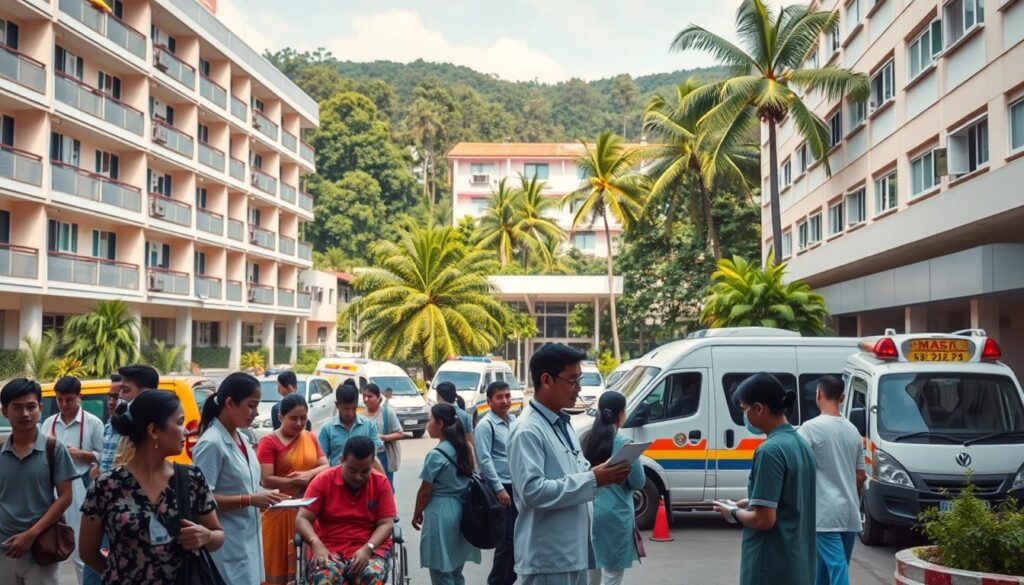
Knowing how to use Thailand’s healthcare system makes your trip safer and healthier. Being prepared and informed is key to staying healthy in Thailand.
What to Do in Case of Illness
If you get sick in Thailand, knowing the local healthcare system is key. Having a plan can really help. It reduces stress and ensures you get the care you need.
Recognising Symptoms and When to Seek Help
It’s important to know the signs of common health issues in Thailand. These can be mild, like food poisoning, or serious infectious diseases needing quick medical help.
Look for severe symptoms like high fever, trouble breathing, or severe stomach pain. These need immediate medical attention. Also, watch out for mosquito-borne diseases like dengue fever and Zika virus, common in some areas.
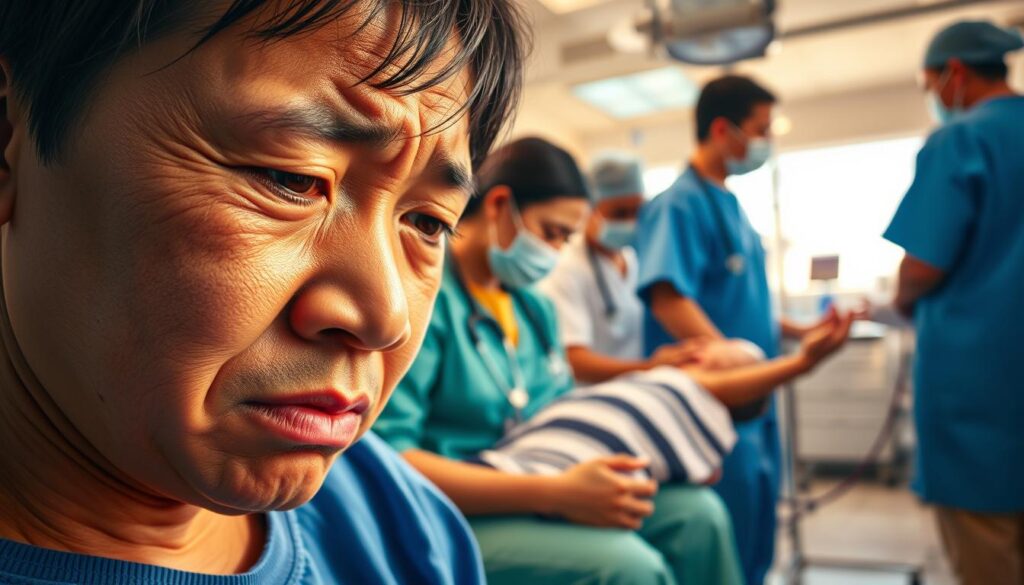
Insurance and Medical Evacuation Considerations
Travel insurance that covers medical costs is essential. Make sure it includes emergency medical evacuations, which can be very expensive. Knowing your insurance and how to get medical help in Thailand is important for good care.
If you need to be flown to a hospital, your insurance will handle it. They work with local authorities and evacuation services. Keep your insurance details handy for a smooth process.
Being informed and prepared can help you avoid health risks in Thailand. It ensures you get the care you need if you get sick.
Post-Travel Health Checks and Advice
After coming back from Thailand, it’s key to watch your health closely. Some diseases might show up later. It’s important to keep an eye on your health and get medical help if you’re not feeling right.
Health Monitoring After Return
Look out for any odd symptoms like fever, diarrhoea, or skin rashes. These could mean you’ve caught something while travelling. If you notice these signs, see a doctor right away.
Seeking Medical Attention
If you get sick after being in Thailand, tell your doctor about your trip. Mention any vaccinations you got before you left. This helps your doctor figure out what’s wrong and treat you properly.
Being careful about your health after visiting Thailand is vital. It ensures you stay safe and healthy back home. Taking care of your health after travel is just as important as getting vaccinated before you go.


